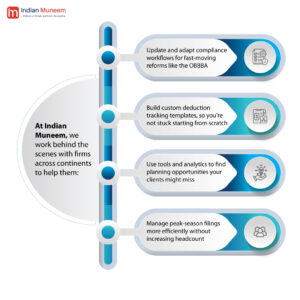If you’re in accounting or tax planning, you’ve probably already heard the buzz: the One Big Beautiful Bill Act (OBBBA) is here and it’s not just another tweak to the system. It’s a massive piece of legislation that locks in some old rules, rewrites others, and creates fresh opportunities and headaches in equal measure.
This isn’t just a technical update; it’s a game-changer that will significantly impact how firms plan, strategize, and support clients across various industries.
Whether you’re running a busy CPA firm in the U.S., advising expats in Singapore, or offering outsourced support from New Zealand to North America, here’s what the One Big Beautiful Bill Act means for you, and how you can get ahead of it.
So, What’s Actually in the One Big Beautiful Bill Act?
Let’s skip the fluff and get straight into what’s new, what’s staying, and what’s being overhauled. At its core, the OBBBA is a major continuation and expansion of the 2017 Tax Cuts and Jobs Act (TCJA). But it doesn’t just extend past changes, it reshapes how some deductions, caps, and credits work from 2025 onward.
Here’s a breakdown of key changes
✅ TCJA Provisions Made Permanent
These aren’t temporary anymore, they’re locked in for good.
- Standard Deduction: The increased standard deduction (almost twice as much as under the TCJA) now remains in effect permanently.
- Lower Individual Tax Rates: The lower tax rates introduced in 2017 will no longer expire; they’re now permanent.
That makes long-term planning a bit less volatile, but it also means clients need more precise strategies to avoid overpaying.
🧾 SALT Deduction Cap: Finally Loosened (Sort of)
One of the most controversial features of the TCJA, the $10,000 SALT cap, gets a serious upgrade:
- Raised Cap: Starting in 2025, the cap increases to $40,000.
- Annual Growth: It will increase by 1% annually through 2029.
- Phaseouts: Kicks in at $500,000+ MAGI, meaning higher earners will still need to observe.
- Expiration: Reverts to $10,000 in 2030 (unless further extended or revised).
👉 Why this matters: High-income clients in high-tax states (California, New York, etc.) now have some breathing room, but only temporarily. You’ll need to carefully time deductions.
💡 New Deductions You Shouldn’t Miss
The OBBBA isn’t just about locking in old stuff. It adds brand-new deductions that open the door to serious planning opportunities:
- Tip Income Deduction: Up to $25,000 in tips is now deductible.
- Social Security Bonus: Seniors aged 65+ can now deduct an extra $6,000 in Social Security income.
- Auto Loan Interest Deduction: From 2025 to 2028, individuals can deduct up to $10,000/year in interest on new personal-use vehicle loans. However, this phase-out occurs at higher income levels.
These aren’t gimmicks, they’re solid, tangible shifts that can make a meaningful difference for individual taxpayers.
Real-World Challenges for Tax and Accounting Firms
Let’s face it: exciting tax updates come at a cost – headaches. The One Big Beautiful Bill Act is no different.
Here are the most common points we see firms struggle with:
- Staggered Effective Dates: Some provisions take effect immediately, while others will be implemented in 2025 or 2026. Keeping track is a spreadsheet nightmare if you’re not organized.
- Misconceptions Everywhere: Clients are already misreading headlines and assuming they qualify for deductions that haven’t even started yet.
- Tech Systems Need Updating: Tax organizers, client comms, and planning templates all need to be rebuilt to reflect the new rules.
How to Turn These Challenges Into Growth Opportunities
Here’s where proactive firms have an edge, and where firms like Indian Muneem can step in to support others.
If you’re a CA/CPA firm in the U.S., UK, Singapore, or beyond, outsourcing key tax planning or compliance tasks to expert teams can free you up for the high-value work: client strategy, education, and advisory.

You don’t need to figure out all pages of the bill alone. With offshore support that’s actually aligned with your goals, you stay nimble, compliant, and in control.
Strategic Tax Planning: The New Must-Have
Beyond just reacting to the OBBBA, smart firms are already rethinking their planning strategies. Why? Because several new features create long-term opportunities:
- Estate Planning: The estate tax exclusion has increased to $15 million, adjusted for inflation. That opens up a big window for HNWI planning.
- QSBS Gains: Qualified Small Business Stock exclusions jump from $10 million to $15 million. For startup investors and early employees, that’s a game-changer.
- Charitable Contributions: Non-itemizers can now claim a permanent deduction starting 2026. Cue the donor-advised fund strategies.
Let’s Talk Impact: What Should You Be Doing Now?
Here’s the simple checklist we’re recommending to all firms we support:
✅ Review client portfolios now and group them by likely benefit category (estate, SALT, QSBS, etc.)
✅ Train your staff on the deductions and their start dates—there’s already a lot of confusion
✅ Update your 2025 tax planners and engagement letters—many need to reflect new caps and thresholds
✅ Consider offloading backend tax prep or analysis work so your senior team can focus on strategic client conversations
This isn’t the time to play catch-up. It’s time to lead the conversation with your clients.
Final Thoughts: What the One Big Beautiful Bill Act Means Going Forward
The One Big Beautiful Bill Act is not just another tax reform. It’s a major recalibration, locking in some of the TCJA’s most significant provisions, expanding deductions in a few unexpected ways, and offering real planning value for clients who act early.
For tax professionals, the challenge is not just to know the Act; it’s to translate it into action. That means updated systems, more thoughtful planning, clearer communication, and (in most cases) some much-needed help with the heavy lifting.
If your firm is looking to scale strategically, stay compliant, and give clients an edge under the new rules, Indian Muneem is here to help.
Because the next tax season? It’s going to be big, fast, and full of both risk and opportunity. Make sure you’re not just keeping up, you’re staying ahead.




